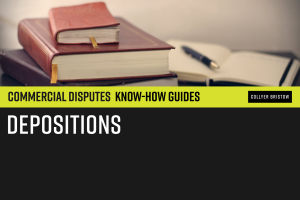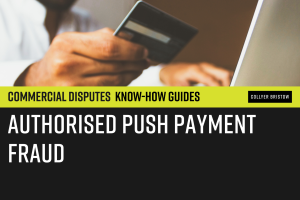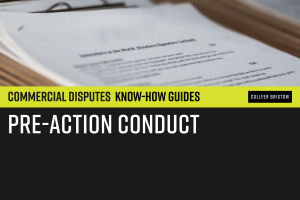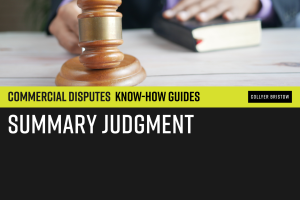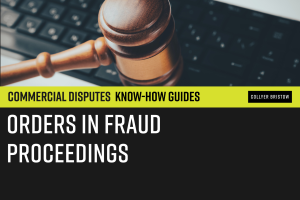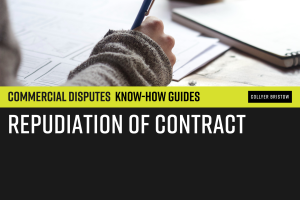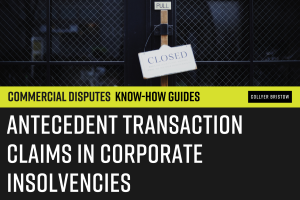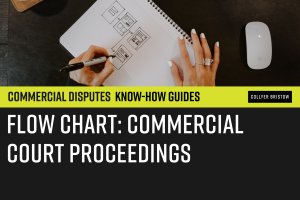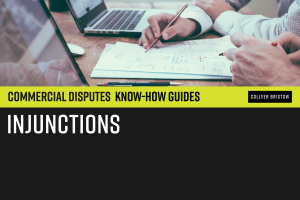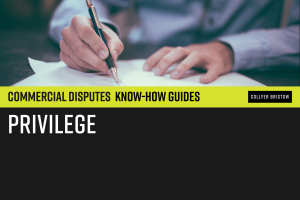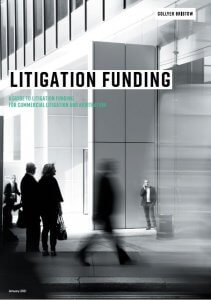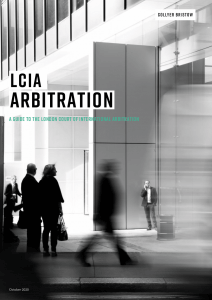
The Team
Our lawyers have the expertise and experience to provide you with creative, personalised solutions in a clear and understandable way.
Our Publications
Discover a wealth of invaluable guidance in the form of guides and brochures written by our expert lawyers.
Our insights
Discover the latest insights and thought leadership from our team of legal experts.
About
Our commercial litigation and dispute resolution lawyers advise organisations across a wide variety of industries on the full range of commercial disputes. We work with you closely, becoming experts in your industry and gaining a full awareness of the intricacies of your business and its activities. We will then use this knowledge to provide you with carefully tailored, dynamic solutions which fit into your wider commercial strategy and deliver results.
We pride ourselves on being a team of creative strategists with the expertise to undertake extremely high-value and complex claims, which often involve an international element, in a proactive and cost-effective manner.
Crucially we have strong relationships with litigation funders, an important new facet of the litigation landscape. This puts us in the unique position where, once we have helped clients find the right funding, we can move forward in tandem with the funders to achieve the best possible outcome for your business.
Resolving complex business litigation challenges
Commercial disputes arising out of the supply of goods and services, joint ventures or distribution agreements, and the breakdown of commercial relationships are often disruptive, time-consuming and can be highly damaging to your bottom line, reputation and in some circumstances survival. It is in everyone’s interest to resolve these disputes as quickly as possible.
At Collyer Bristow, we work with you to resolve these disputes through litigation, arbitration or mediation. Our commercial disputes resolution group skillfully guides you through the courts, tribunals and international arbitral processes. As advocates for alternative dispute resolution, we have a reputation for using more bespoke processes to resolve your commercial dispute, according to the sector or subject matter. Our job is to resolve your dispute quickly and effectively before it becomes a major drain on your time and resources.
Skilful commercial litigation & dispute resolution, in or out of court
Sometimes, a trial is unavoidable. In those circumstances, we litigate robustly and fight your corner.
We have extensive experience in acting in complex, sensitive and high-value international and domestic matters, and proceedings all the way up to the Supreme Court. Our aim is to protect your personal and business interests, helping you achieve the best possible outcome and secure your future commercial objectives.
Robin HenryPartner - Head of Dispute Resolution Services
+44 20 7470 4429+44 7943 503198robin.henry@collyerbristow.com
Services
We support our clients with individually tailored legal advice, in areas such as:
- Partnership Disputes
- Boardroom Disputes
- Complex Claims
- Breach of Contract
- Company Disputes
- M&A and Warranty Claims
- Shareholder Disputes
- Breach of Directors’ Duties
- Agency Disputes
- Professional Negligence
- Civil Fraud
- Trade Disputes
- Product Liability
- Litigation Funding
- Alternative Methods of Dispute Resolution
- International & Cross Border Disputes
Partnership Disputes
Partnership disputes can arise at any point in the life of a partnership and usually involve issues of liability or departure. With conventional partnerships, a third party can claim against both the partnership and the partners themselves for actions taken in the course of the partnership. When disputes arise, it is often because the partners cannot agree on how their liability is apportioned – especially if the partnership agreement is unclear.
Disagreements can also occur when one or more of the partners wants to leave the partnership. A dispute may arise over the terms of their departure; for instance, a partner may want to withdraw money they invested in the partnership, which could cause a problem for the remaining partners and the business.
Other types of partnership disputes we regularly act on include:
- Partner rights and governance matters
- Enforcement of partnership clauses or LLP members’ agreement
- Partner expulsions and retirement
- Dissolution and termination of a partnership
- Enforceability and breaches of restrictive covenants
- Division of partnership assets
- Claims relating to misuse of partnership assets and breaches of fiduciary duty
Our partnership disputes expertise
Each of these disputes demands the skilful application of specialist partnership law to determine the rights and obligations of partners, whether that relates to a traditional partnership, a Limited Liability Partnerships (LLP), or a cross-jurisdictional partnership dispute.
At Collyer Bristow, our commercial litigation lawyers are experts in acting quickly and pragmatically to provide accurate and timely advice to clients. Our approach is to minimise costs wherever possible by seeking a fair and commercial settlement to a partnership dispute without resorting to formal litigation – although if court proceedings are needed, you’ll have our full support. Collaboration is a key part of our service, and we work closely with our colleagues in corporate, financial, real estate, employment and private wealth to provide clients with the expert advice that they need.
Boardroom Disputes
Company disputes between directors
All company directors have various fiduciary and statutory duties, including a duty to promote the success of their company. At first glance, this obligation seems like a straightforward one. But directors do not always see eye to eye – for example, there will always be clashes between those directors who wish to retain money in a business to invest, and those who wish to pay a larger dividend to shareholders.
When disputes between directors arise, the board of directors is entitled to call upon solicitors for impartial advice. Importantly, only the company itself can bring a claim against a director who is acting wrongfully. Thus, the legal team acts for the company in this situation, rather than the individual directors. This ensures that the advice is both independent and commercial, and will be in the interest of the long-term success of the organisation.
Our approach to director disputes
At Collyer Bristow, we handle all types of boardroom disputes including:
- Deadlock in decision making
- Problems with performance
- Breach of directors’ duties
- Conflicts of interest
- Removing a director from the board
We recognise that every boardroom dispute is different. While in some cases litigation will be the best way to achieve a favourable outcome, other times we can better resolve the dispute through simpler actions. Options include amending the shareholders’ agreement to avoid deadlock decisions or recommending the appointment of a non-executive director who can bring additional expertise to the table and stop potential disputes before they escalate.
We have a team of lawyers from across our dispute resolution and non-contentious business departments who work together to ensure that dispute is resolved in the most cost- and time-effective way.
Complex Claims
While there’s no single definition of a ‘complex’ claim, it usually means something that is procedurally complicated or contains a high degree of difficulty. For example, a complex case might:
- Be highly technical and/or require a specialist understanding of the facts
- Cross borders or overlap between legal jurisdictions
- Have a large number of parties participating in the action, especially if they are separately represented
- Involve a large number of procedural steps, including one or more levels of appeals from earlier decisions
- Involve a large number of interlocking issues within the overall dispute
By definition, these claims tend to be more expensive and time-consuming than other types of claims. They don’t usually happen in isolation and can have wide-ranging consequences for your business. Often, there are higher stakes involved – which means you need advisors who understand your industry, your organisation, and its long-term goals.
Representing clients in an array of complex claims
Collyer Bristow has decades of experience representing clients in complex commercial claims. Our lawyers have successfully won claims for and against prominent institutions, multinational corporations and other parties across a broad range of industries, including financial services, investment funds, telecommunications, media and technology.
Our solicitors can advise you during settlement negotiations, mediation, arbitration and court proceedings. We can also help you consider the effects of the claim on the company’s operations, finances, media profile and competitive position, before offering proactive advice on effective litigation strategies consistent with your business goals.
Breach of Contract
A majority of commercial disputes arise because someone has failed to meet their obligations under the terms of an agreement. Despite this, breach of contract law remains frustratingly complex. Even where a written contract exists, the parties often find it difficult to show that a breach has taken place, or quantify the financial losses suffered by the person who is on the receiving end of the breach.
What are the remedies for breach of contract?
The usual remedy for breach of contract is damages. However, breach of contract claims can give rise to all sorts of legal remedies, from terminating the contract to a claim for specific performance, where you compel the at-fault party to do what they said they would do. Sometimes, it is possible to get an injunction to stop the undesirable behaviour and restrain further breaches of contract.
In many commercial contracts, there are clauses that expand, reduce or change the remedies available for breach of contract. For example, it is common to see:
- Indemnities to enhance damages claims
- Exit or escape clauses
- Set offs or limitations on the amount of damages payable for a breach or an indemnity
- Liquidated damages clauses
- Retention of title clauses
Each of these contract clauses has different implications for your business, as does the nature of the dispute. For example, if the issue relates to a material breach that goes to the heart of the contract, as opposed to an anticipatory breach where the other party tells you that they will not be carrying out a contractual term, then your options and remedies may be very different.
Experts in breach of contract law
As a renowned London law firm specialising in commercial dispute resolution, Collyer Bristow is the smart choice for breach of contract disputes, including international contract disputes and complex claims. Contractual disputes vary, but we have the right expertise to quickly identify key issues such as the remedies and categories of damages available, the potential for alternative dispute resolution, and the likelihood of success. We pull out all the stops to put things right and get your business back on track.
Company Disputes
The complex and often competing relationships between a company, its directors, shareholders and employees means that company disputes can arise in a number of different areas. For example, there may be battles over directors’ remuneration, deadlock in decision making, or shareholders may be unhappy with the way the company is being run.
Whatever the nature of the dispute, our specialist company disputes solicitors can represent your business during negotiations, alternative dispute resolution, and court proceedings. We can also help to nip potential issues in the bud or help you strategise for a dispute you think is coming.
Dealing with company disputes – what can be done?
Taking expert legal advice at an early stage can help prevent disputes that could otherwise escalate into something far more damaging. If not addressed swiftly, company disputes can put pressure on a company’s ability to operate and, ultimately, on its finances. In extreme cases, a company dispute can undermine the company’s trade, brand and reputation.
Our expertise in corporate disputes includes:
- Corporate governance
- Fraud, dishonesty and misappropriation of corporate funds
- Boardroom battles
- Director’s duties and liabilities
- Advising on the removal or disqualification of directors
- Shareholder disputes
- Unfair prejudice petitions
- Deadlock situations
Court cases can be time-consuming to prepare and they may divert your attention away from the core business. We try to resolve your dispute through negotiation, mediation or arbitration methods. But if the company dispute cannot be resolved, our litigation lawyers will ensure that you have robust representation in court.
M&A and Warranty Claims
Post-M&A disputes and warranty claims are on the rise in today’s fast-paced and complex M&A environment. Parties in a transaction are under pressure to maximise deal value, especially in challenging economic times like a pandemic.
Buyers and sellers often find themselves in a dispute over a range of issues, such as:
- Financial disputes and purchase price adjustments
- Unforeseen exposures due to weak pre-deal due diligence
- Breaches of representations and breach of warranty claims
- Allegations of fraud
- Unwinding transactions where post-completion conditions are not satisfied
Expert support for post-deal M&A and warranty claims
When M&A and warranty claims arise, it is important to identify the relevant facts, systematically isolate the main commercial issues, and understand the potential economic impact as soon as possible. M&A and warranty claims can involve complex technical and financial issues, as well as cross-border locations, multiple jurisdictions and languages, and different accounting standards. Large sums, usually in the millions, are involved in these types of claims.
Fortunately, many M&A and warranty claims can be resolved through negotiation or mediation, which is often the best solution considering that trust and good-faith communication is essential to the business relationship of the parties post-merger. We support clients through all forms of alternative dispute resolution, which allows the parties to exercise greater control and creativity over the way their dispute is resolved than would be the case in court litigation.
If no settlement can be reached, we look to arbitration or formal litigation to resolve the claim. Most disputes involving warranty claims are typically resolved in arbitration.
Read our Commercial Disputes Know-How Guide on Breach of Warranty Claims (Share Acquisition).
Shareholder Disputes
The two most common shareholder disputes actions are an unfair prejudice petition and derivative action.
How do you resolve shareholder disputes?
An unfair prejudice petition takes place under Section 994 of the Companies Act. Here, a minority shareholder who believes that the company is treating some or all of its members unfairly can ask the court to step in. Examples include:
- Failing to pay dividends to the shareholders
- Breaching the terms of the articles of association
- Mismanagement by the board
- Money being unfairly paid out e.g. majority shareholders taking the lion’s share of remuneration
- Inappropriate exclusion from decision making
Typically, a section 994 action will result in the petitioning shareholder being bought out by the other shareholders – although the court can make other awards.
With a derivative action, shareholders can step in if wrong has been committed against the company but the directors are unable or unwilling to pursue it themselves – often because they are the perpetrators. The Companies Act 2006 gives shareholders the right to “stand in the shoes” of the company to make the claim.
Pragmatic solutions to shareholder disputes
Our commercial disputes and business departments work hand in hand to resolve shareholder disputes, as the majority lead to some type of settlement, whether negotiated or arising out of formal litigation. Remedies range from straightforward ‘clean break’ buyouts to the company purchasing its own shares, to a demerger where the business is split up and transferred into the names of different shareholders.
A negotiated agreement is generally preferable to a court award as the parties have much more freedom to resolve shareholder disputes creatively and structure the transaction in a tax-efficient manner.
Read our Commercial Disputes Know-How Guide on Shareholders’ Disputes.
Breach of Directors’ Duties
Directors have a fiduciary duty to act in good faith in the best interests of the company and must put the interests of the company over their own personal interests. They also owe seven specific statutory duties under the Companies Act 2006.
What are my duties under the companies act 2006?
- To act within the powers given to them in the company’s constitution – usually, its articles of association.
- To promote the success of the company for the benefit of its shareholders as a whole – having regard to the long-term consequences of any decision, amongst other things.
- To exercise independent judgment.
- To exercise reasonable care, skill and diligence – this is judged against an objective standard reasonably expected of a company director and also takes into account the specific skill, knowledge and experience that the director actually has. More might be expected of an executive director with specific professional qualifications, such as the finance director, for example.
- To avoid conflicts of interest – for example, an interest in a competing business.
- Not to accept benefits from third parties – including, but not limited to, taking bribes.
- To declare interests in transactions or arrangements with the company – the company’s constitution typically will include further provision as to how conflicts of interest should be managed, for example, by restricting voting on affected transactions.
Failing to observe any of these obligations could give rise to a breach of directors’ duties claim.
Consequences of a breach of directors’ duties
Directors’ duties are owed to the company and, with limited exceptions, only a company can enforce them. The main exception is a derivative action by shareholders.
The usual remedy for breach of directors’ duties is compensation. Other remedies include an injunction against the director, setting aside the transaction, and having the director disqualified. Claims can be brought against the director personally and, crucially, their liability is not limited. This means that a director’s personal assets are potentially at risk if they are found to be in breach of directors’ duties.
If you are faced with a breach of directors’ duties at your organisation, speak to the commercial disputes team at Collyer Bristow. We take a commercial approach to cases, and are adept at the use of alternative dispute resolution methods, including direct face-to-face negotiations and mediation, to help clients find fast and cost-effective solutions to their disputes.
Breach of directors’ duties claims can have far-reaching consequences for the business. We act quickly to preserve your valued business relationships and prevent repetitions of the breach in the future.
Read our Commercial Disputes Know-How Guide on Actions for Breach of Directors’ Duties.
Agency Disputes
A commercial agent is a person or organisation who acts on behalf of a principal. For example, a company may use a commercial agent to negotiate product sales but the contract will still be between the company and the end customer. The agent will usually receive a commission for their services.
Commercial Agents (Council Directive) Regulations 1993
While there are many different types of agency, all of these arrangements have special characteristics and protections in law. Many are governed by the Commercial Agents (Council Directive) Regulations 1993 which lays down a plethora of rules regarding the duties of each party, remuneration of the agent, and how you go about terminating the agency relationship.
Termination can have serious consequences since the principal may have to compensate the agent for the loss of the agency. It’s also the area where most disputes arise. Getting quality advice on strategically terminating an agency agreement can limit exposure and ensure the best possible outcome to the dispute.
Expert support from a leading agency disputes team
We advise both principals and agents on all types of agency disputes. For principals, our aim is to minimise your liability under the Regulations. For agents, we seek to tie up the arrangement fairly and ensure that you are properly compensated.
Some of the areas we help with include:
- Reviewing an agent’s conduct may justify immediate termination in some cases
- Determining if a principal is liable to pay compensation and if so, how much should be paid
- Preparing notices to lawfully terminate the agency relationship
- Advising on complex, cross-border agency relationships, where there may be issues of where the agency dispute arises
- Drafting clean-break, exposure-limiting settlement agreements
As with most types of disputes, prevention is better than cure. The starting point is a watertight agency agreement that sets out each party’s duties, rights and expectations, as well as the mechanisms for termination. We work hand-in-hand with our non-contentious business team on agency matters, offering a cradle-to-grave service from contract creation to termination and beyond.
Professional Negligence
Professionals are required to exercise reasonable skill and care when going about their duties. However, ‘reasonable’ is a wide-open term and there is a big difference between receiving ‘negligent’ service and simply receiving a ‘poor’ service that does not have a significant consequence for the business.
The latter might give rise to a complaint and a change of professional advisors – you don’t want to throw good money after bad, after all – but it would not qualify for a professional negligence claim.
Who can you make a professional negligence claim against?
You can make a claim against any types of professional including, but not limited to, the following:
- Solicitors negligence
- Barristers negligence
- Negligence by accountants
- Financial advisor negligence
- Negligence by tax consultants
- Surveyors negligence
- Architects negligence
- Insurance brokers negligence
- Negligence by engineers
Each of these professions has its own professional standards and codes of conduct that members are expected to live up to. These standards are a good objective starting point for determining whether someone has delivered a negligent service, or merely a poor service. However, professional negligence is a complex area of commercial disputes which often turns on technical issues of fact and law.
For example, a tax advisor may give tax structuring advice that costs you money. However, loss alone does not constitute grounds for a professional negligence claim. To show negligence, you would have to prove that the advice you received was not consistent with advice that another reasonable tax advisor would have given. That will often require expert evidence from an independent expert.
Do you have a professional negligence claim?
The best way to find out if you are eligible to make a professional negligence claim is to have a chat with one of our specialist professional negligence solicitors. Our commercial disputes team have a first-rate reputation for providing advice in professional negligence disputes. Together, we will explore your options, including fast and cost-effective alternative dispute resolution to fulfill your needs and objectives.
Civil Fraud
Civil fraud is a technical area of the law that can be quite mystifying to those who find themselves involved in it. Fundamentally, it involves making (or defending) an allegation of fraud in the civil courts rather than reporting the fraud to the police and having the criminal justice system take care of the matter.
Some organisations prefer the civil fraud route as they have more control over the proceedings, and the standard of proof is lower in civil law cases. You have to show that fraud was committed on the “balance of probabilities”, where a criminal accusation must be proved “beyond reasonable doubt.”
Different types of civil fraud claims
The tort of deceit is the most common type of civil fraud claim. This occurs when the defendant knowingly made a false representation to induce the claimant to act in some way and, as a result, the claimant suffered a loss.
There are other types of civil fraud, however, and any act that involves some sort of deception could give rise to a civil fraud case, including:
- Cross-border fraud
- Unjust enrichment, for instance, the claimant gives money to a partner to invest in a venture but the partner keeps the money for himself instead of investing it
- Unlawful means conspiracy, where multiple characters play a part in the fraud, such as a shareholder conspiring with a company in which he owns shares
- Sham trusts
Our approach to civil fraud
Civil frauds are complex disputes and all require a careful approach. Our civil fraud solicitors are experts in both making and challenging civil fraud claims and have a reputation for giving our clients a proactive, strategic response – no matter how complicated the claim, how sophisticated the fraud, or how much money is at stake.
Huge amounts of preparatory work are required before we attempt to reach a settlement or take a case to court. Our team also has extensive experience in pursuing alternative legal strategies such as freezing orders to stop money or assets from being moved before a judgment is made.
Trade Disputes
Operating in the global marketplace provides avenues for growth and revenue expansion, but it also widens the potential for trade disputes. Trading businesses need to import and export goods and services in accordance with national and international trade laws that seem to expand and change on a daily basis. To make things more complicated, every region in the world has a different approach to resolving trade disputes and how negotiations are conducted.
We help businesses navigate complex trade disputes and cross-border challenges. Our commercial disputes lawyers have substantial experience in this area and regularly solve problems relating to the international sales of goods, including letters of credit, bills of exchange, charter parties, bills of lading disputes, export licence controls and insurance claims.
We find solutions based on pragmatism and our extensive experience, offering a fresh perspective on any trade dispute, clash or breach of contract.
Quick and cost-effective trade disputes resolution
Trade disputes are particularly responsive to creative commercial solutions, whether by negotiated settlement, in court, or by using the flexibility of the arbitral process. We have a strong record of success in High Court litigation proceedings, LCIA and other arbitrations, and through alternative dispute resolution.
Through hands-on management, we deliver succinct and relevant advice to you, on time and within budget.
Product Liability
Few commercial businesses can wholly eliminate risk when it comes to their products. When a dispute becomes an issue of liability, the matter needs careful handling to protect the brand and reputation of the business, as well as profits.
Collyer Bristow’s specialist product liability team has extensive experience in defending and minimising product liability claims, including:
- Compensation claims for negligence or breach of contract
- Strict liability resulting from defective products
- Safety issues
- Claims against others who may have contributed to the product liability claim
- Product recall
We offer support on a whole spectrum of issues from minor disputes through to the most complex disputes.
End-to-end product liability defence and protection
The aim of a product liability lawyer is to resolve your claim quickly and effectively so you can get back to business. Where possible, we will seek alternatives to litigation to minimise time, cost and interruptions to your operations. Many cases can be resolved by mediation or face-to-face negotiations, even where multiple parties are involved.
Our complete service deals with the wider aspects of public liability too. We are one of the few firms to have a specialist in-house corporate reputation management team who can work with you to minimise the effects of negative press reporting arising from the product liability claim.
Litigation Funding
Legal claims can be expensive and the outcome unpredictable. So it’s understandable that a key consideration for many of our clients is how the legal action will be funded. The last thing you want to have to do is abandon the claim or strategically limit your settlement options because of an inability to fund the litigation.
Alternative options for funding litigation
Getting early advice on suitable options to fund litigation is key to reducing financial exposure. We’re happy to discuss a range of options, including:
- Legal expenses insurance – insurance taken out before the dispute, often as part of a wider pack of commercial insurance products.
- Conditional fee agreements – An agreement between a client and solicitor whereby all or part of the solicitors’ fees will only be payable by the client in certain circumstances, normally if the client wins the case.
- Damages-based agreements – essentially a pre-agreed percentage split of any money recovered; if the claim fails, the solicitor receives nothing. Attractive as the parties know exactly where they stand.
- Third-party litigation funding – a specialist third-party funder with no connection to the dispute agrees to finance some or all of the legal costs in return for a share of the damages if the claim is successful.
At Collyer Bristow, we are intimately familiar with all types of litigation funding and are receptive to any bespoke financial models. We can introduce you to the leading litigation funders who may be able to assist where you need alternative funding for your case.
Alternative Methods of Dispute Resolution
Court is not an easy option. Sometimes, you will get a better – and swifter – result by engaging in one of the many alternative methods of dispute resolution. This might be a range of things, from sitting down around a table and thrashing out a settlement, to a more formal approach such as mediation or arbitration.
Alternative forms of dispute resolution
Arbitration is a quasi-judicial form of dispute resolution. There is the option to appoint an arbitrator or a panel of arbitrators with particular expertise in the relevant area. The arbitrator has more discretion than a court in the solution they award, and the decision is legally binding with only limited avenues for challenging the arbitrator’s decision so the case is effectively done and dusted when the award is made.
Generally, the arbitration will be conducted according to the rules of an arbitral organisation, such as the LCIA or the International Chamber of Commerce.
Expert determination offers another more flexible method of resolving disputes. It is far less regulated than arbitration and the non-legal expert has more freedom to draw on his own expertise and make whatever inquiries he deems relevant. It is often a good option where the dispute is more technical as opposed to legal or factual in nature, such as the quantification of loss in a delayed construction project.
Why choose our dispute resolution team?
Our clients don’t just get a lawyer – they get a strategic partner. Work with Collyer Bristow and you’ll get tactical advice on the best way to resolve a dispute, whether that’s through negotiation, mediation, arbitration, expert determination or some other imaginative solution that meets your objectives on time, cost and risk. Where litigation is unavoidable, we have the experience to fiercely fight your corner all the way up to the Supreme Court.
International & Cross Border Disputes
International commercial disputes can be challenging to resolve in today’s business climate – especially as transactions may take place in several jurisdictions and also online.
International litigation holds a level of risk for all businesses. We seek to minimise that risk by developing a creative solution to your commercial dispute and putting a pragmatic plan of action in place. Our solicitors can help with forum shopping as well as representing your business during international, multi-party negotiations, mediation, arbitration and, as a last resort, court proceedings.
The UK has reciprocal agreements with more than 100 countries, which means that for most cross border disputes, a bilateral agreement will apply. Once a decision or settlement is made in your favour, we can help to enforce it through the relevant Convention or Regulation, with supporting actions such as worldwide asset tracing and freezing orders to protect the money or assets that are owed to you. For clients based overseas, we can also assist with enforcing foreign court judgments and arbitration awards against UK-based defendants.
Where there is no bilateral agreement, such as in Russia or China, we have access to a friends network of local lawyers who can support cross border disputes litigation in every corner of the globe.
Quick glance: publications
- Commercial Disputes Know-How Guides: Depositions
- Private equity/post M&A disputes
- Commercial Disputes Know-How Guides: Authorised Push Payment (APP) Fraud
- Commercial Disputes Know-How Guides: Shareholders’ Disputes
- Commercial Disputes Know-How Guides: Strike Out Applications
- Commercial Disputes Know-How Guides: Pre-Action Conduct
- Commercial Disputes Know-How Guides: Breach of Warranty Claims (Share Acquisition)
- Commercial Disputes Know-How Guides: Security for Costs
- Commercial Disputes Know-How Guides: Force Majeure
- Commercial Disputes Know-How Guides: Summary Judgment
- Commercial Disputes Know-How Guides: Actions for Breach of Directors’ Duties
- Commercial Disputes Know-How Guides: Freezing Injunctions
- Commercial Disputes Know-How Guides: Orders in Fraud Proceedings
- Commercial Disputes Know-How Guides: Repudiation of Contract
- Commercial Disputes Know-How Guides: Antecedent Transaction Claims in Corporate Insolvencies
- Commercial Disputes Know-How Guides: Commercial Court Proceedings Flow Chart
- Commercial Disputes Know-How Guides: Disclosure Duties in Court Proceedings
- Commercial Disputes Know-How Guides: Application to Challenge Arbitration Awards
- Commercial Disputes Know-How Guides: Winding-Up Petitions
- Commercial Disputes Know-How Guides: Requests for Further Information
- Commercial Disputes Know-How Guides: Injunctions
- Commercial Disputes Know-How Guides: Without Prejudice Negotiations
- Commercial Disputes Know-How Guides: Privilege
- Dispute resolution services
- Litigation funding
- DIRECT ACCESS SUPPORT FOR COUNSEL:litigation and arbitration services - litigation and arbitration services
- LCIA ARBITRATION:A guide to the London Court of International Arbitration - A guide to the London Court of International Arbitration
- CONFLICT OF INTEREST SERVICES FOR LAW FIRMS
Commercial Litigation & Dispute Resolution Publications
Commercial Disputes Know-How Guides: Depositions
Hague Convention letters of request are an effective and common tool used by US litigants to obtain evidence and documents from potential witnesses in the UK where the witnesses are unwilling to give evidence voluntarily for US proceedings.
Discover our new series of practical know-how guides for those involved in commercial disputes.
Private equity/post M&A disputes
Often involving complex, cross-border issues, our team has a great deal of experience in resolving the full range of post-M&A disputes.
Commercial Disputes Know-How Guides: Authorised Push Payment (APP) Fraud
Authorised push payment (“APP”) fraud is reportedly the largest class of payment fraud in the UK. There may be the opportunity to obtain compensation under a voluntary banking code and to complain to the Financial Services Ombudsman (“FOS”) if compensation is not paid.
Discover our new series of practical know-how guides for those involved in commercial disputes.
Commercial Disputes Know-How Guides: Shareholders’ Disputes
Shareholders disputes can arise for any reason, but common circumstances include a divergence of opinion for the future direction of the company or the unfair distribution of responsibilities between the parties.
Discover our new series of practical know-how guides for those involved in commercial disputes.
Commercial Disputes Know-How Guides: Strike Out Applications
The purpose of an application to the court to strike out is the deletion of material from a party’s statement of case so that it cannot be relied on in the proceedings. If a whole statement of case is struck out, this should lead to the court giving judgment for the applying party.
Discover our new series of practical know-how guides for those involved in commercial disputes.
Commercial Disputes Know-How Guides: Pre-Action Conduct
Under the Civil Procedure Rules 1998 (“the CPR”), a claimant is expected to take certain steps before issuing court proceedings, including exchanging information with the intended defendant, and attempting to settle the matter in dispute.
Discover our new series of practical know-how guides for those involved in commercial disputes.
Commercial Disputes Know-How Guides: Breach of Warranty Claims (Share Acquisition)
Warranties are contractual statements of fact that are typically given by a seller to a buyer in a share purchase agreement (“SPA”) or other contract as one of the ways in which risk is allocated between parties in the acquisition of a target company (the “Target”).
Discover our new series of practical know-how guides for those involved in commercial disputes.
Commercial Disputes Know-How Guides: Security for Costs
A party to proceedings (usually the defendant) may be able to obtain an order that another party (usually the claimant) provide security for its costs.
Discover our new series of practical know-how guides for those involved in commercial disputes.
Commercial Disputes Know-How Guides: Force Majeure
Force majeure refers to events which are beyond the control of the parties to a contract such as war, epidemic, geological disaster or an act of god.
Discover our new series of practical know-how guides for those involved in commercial disputes.
Commercial Disputes Know-How Guides: Summary Judgment
Summary judgment is a means by which the court can give judgment on a claim (or a particular issue within a claim) without the need for a trial.
Discover our new series of practical know-how guides for those involved in commercial disputes.
Commercial Disputes Know-How Guides: Actions for Breach of Directors’ Duties
Directors are responsible for the management of a company’s business and so are subject to certain duties to safeguard the interests of the company.
Discover our new series of practical know-how guides for those involved in commercial disputes.
Commercial Disputes Know-How Guides: Freezing Injunctions
Freezing orders are a severe injunction and are not available by right – the court will exercise its discretion in ordering them.
Discover our new series of practical know-how guides for those involved in commercial disputes.
Commercial Disputes Know-How Guides: Orders in Fraud Proceedings
Disputes in which fraud is suspected involve from the outset important tactical considerations, including identifying, tracing and preserving assets against which to enforce subsequent court orders.
Discover our new series of practical know-how guides for those involved in commercial disputes.
Commercial Disputes Know-How Guides: Repudiation of Contract
If a breach of contract is so serious that it can be said to go to the core of the contract and deprives the innocent party of the benefit of the contract, then it may be a repudiatory breach that gives the innocent party the option of treating the contract as terminated and seeking damages.
Discover our new series of practical know-how guides for those involved in commercial disputes.
Commercial Disputes Know-How Guides: Antecedent Transaction Claims in Corporate Insolvencies
These claims are made under the Insolvency Act 1986 (“the Insolvency Act”) and are known as antecedent transaction claims.
Discover our new series of practical know-how guides for those involved in commercial disputes.
Commercial Disputes Know-How Guides: Commercial Court Proceedings Flow Chart
This guide is a very brief outline only of the Court procedure.
Discover our new series of practical know-how guides for those involved in commercial disputes.
Commercial Disputes Know-How Guides: Disclosure Duties in Court Proceedings
The purpose of “disclosure” is to make available to all parties documents which might tend to support or undermine the parties’ cases.
Discover our new series of practical know-how guides for those involved in commercial disputes.
Commercial Disputes Know-How Guides: Application to Challenge Arbitration Awards
Arbitration is intended to be final and binding but that does not prevent aggrieved parties from applying to the English High Court to challenge the arbitration award.
Discover our new series of practical know-how guides for those involved in commercial disputes.
Commercial Disputes Know-How Guides: Winding-Up Petitions
The various grounds on which a company may be compulsorily wound up are set out in section 122 (1) of the Insolvency Act 1986 (“the Act”).
Discover our new series of practical know-how guides for those involved in commercial disputes.
Commercial Disputes Know-How Guides: Requests for Further Information
These requests are governed by Part 18 of the Civil Procedure Rules (“CPR”).
Discover our new series of practical know-how guides for those involved in commercial disputes.
Commercial Disputes Know-How Guides: Injunctions
The court can issue an injunction to order a party to refrain from doing a particular action or requiring them to do a specified action.
Discover our new series of practical know-how guides for those involved in commercial disputes.
Commercial Disputes Know-How Guides: Without Prejudice Negotiations
The courts encourage parties to settle their disputes and “without prejudice” negotiations are a common tool for that.
Discover our new series of practical know-how guides for those involved in commercial disputes.
Commercial Disputes Know-How Guides: Privilege
‘Privilege’ is a key legal concept in litigation.
Discover our new series of practical know-how guides for those involved in commercial disputes.
Dispute resolution services
An overview of our range of commercial litigation services, supporting businesses operating in a vast range of industries in the resolution of a full range of commercial disputes.
Litigation funding
Guide to the funding available to claimants for complex commercial litigation (and arbitration). It may be helpful for foreign lawyers who may not have a detailed knowledge of litigation funding or who may operate in a jurisdiction where it is prohibited or unpopular.
DIRECT ACCESS SUPPORT FOR COUNSEL:litigation and arbitration services - litigation and arbitration services
An overview of our litigation and arbitration services supporting Counsel instructed by clients on a direct access basis. Our offering is most suited to cases where Counsel is instructed by substantial clients, overseas lawyers or in-house counsel
LCIA ARBITRATION:A guide to the London Court of International Arbitration - A guide to the London Court of International Arbitration
The London Court of International Arbitration (“LCIA”) is one of the world’s leading international institutions for commercial dispute resolution. This guide, prepared mainly to assist non – UK parties, provides an overview of the Court and its processes.
CONFLICT OF INTEREST SERVICES FOR LAW FIRMS
A guide for other law firms on the litigation and arbitration services we provide, and our approach, in circumstances where they require another law firm to act for a client because they have a conflict of interest or for another reason.
“A mid-size firm that can compete with the big firms in important banking, financial services and commercial cases.”
Legal 500, 2024
Commercial Litigation & Dispute Resolution insights
Longer Reads
Nix Of $11B Award Shows Limits Of Arbitral ProcessNix Of $11B Award Shows Limits Of Arbitral Process
Read more
Longer Reads
UK Supreme Court rules Mozambique Tuna Bonds case can be tried in EnglandUK Supreme Court rules Mozambique Tuna Bonds case can be tried in England
Read more
Longer Reads
Director responsibilities amid Russian asset seizuresDirector responsibilities amid Russian asset seizures
Read more
Shorter Reads
Supreme Court’s downplaying of the Quincecare duty does not mean banks are off the hook on customer fraud claimsSupreme Court’s downplaying of the Quincecare duty does not mean banks are off the hook on customer fraud claims
Read more
Longer Reads
Do company directors owe a ‘creditor duty’ when a company is nearing insolvency?Do company directors owe a ‘creditor duty’ when a company is nearing insolvency?
Read more
Podcasts
Directors’ duties – An introductionDirectors’ duties – An introduction
Listen now
Longer Reads
Frozen or terminated bank accounts: What can you do?Frozen or terminated bank accounts: What can you do?
Read more
News
Collyer Bristow continues growth with Commercial Litigation Partner hireCollyer Bristow continues growth with Commercial Litigation Partner hire
Read more
Shorter Reads
Advice for directors in financial services in light of ClientEarth’s threat of legal action against directors of ShellAdvice for directors in financial services in light of ClientEarth’s threat of legal action against directors of Shell
Read more
Shorter Reads
ESG credentials key to attracting private investments, with ethical and moral concerns a deciding factorESG credentials key to attracting private investments, with ethical and moral concerns a deciding factor
Read more
Shorter Reads
ESG litigation: shareholder actions under FSMA 2000: Important questionsESG litigation: shareholder actions under FSMA 2000: Important questions
Read more
Longer Reads
Disputes risks for FS firms: ‘greenwashing’ and ESG reporting obligationsDisputes risks for FS firms: ‘greenwashing’ and ESG reporting obligations
Read more
You might also like
Need some more information? Make an enquiry below
Commercial Litigation & Dispute Resolution key contacts
- Robin
HenryPartner - Head of Dispute Resolution Services
Talk to Robin about Banking & financial disputes, Commercial disputes, Corporate recovery, restructuring & insolvency, Financial regulatory and Personal insolvency
Commercial Litigation & Dispute Resolution
Working with you to resolve disputes through litigation, arbitration or mediation
When it comes to commercial relationships, it is inevitable that disagreements will occur from time to time, even when you own or are responsible for the running of a well-operating, cohesive business. Commercial disputes are inherently stressful and it is vital to resolve them swiftly and effectively so you can get back to focusing on the core day-to-day activities required for commercial success. To support you in navigating these conflicts, you should work with a legal team with the expertise to provide you with innovative strategies which fulfil your objectives and align with your business interests.
The Team
Our lawyers have the expertise and experience to provide you with creative, personalised solutions in a clear and understandable way.
Our Publications
Discover a wealth of invaluable guidance in the form of guides and brochures written by our expert lawyers.
Our insights
Discover the latest insights and thought leadership from our team of legal experts.
Our commercial litigation and dispute resolution lawyers advise organisations across a wide variety of industries on the full range of commercial disputes. We work with you closely, becoming experts in your industry and gaining a full awareness of the intricacies of your business and its activities. We will then use this knowledge to provide you with carefully tailored, dynamic solutions which fit into your wider commercial strategy and deliver results.
We pride ourselves on being a team of creative strategists with the expertise to undertake extremely high-value and complex claims, which often involve an international element, in a proactive and cost-effective manner.
Crucially we have strong relationships with litigation funders, an important new facet of the litigation landscape. This puts us in the unique position where, once we have helped clients find the right funding, we can move forward in tandem with the funders to achieve the best possible outcome for your business.
Resolving complex business litigation challenges
Commercial disputes arising out of the supply of goods and services, joint ventures or distribution agreements, and the breakdown of commercial relationships are often disruptive, time-consuming and can be highly damaging to your bottom line, reputation and in some circumstances survival. It is in everyone’s interest to resolve these disputes as quickly as possible.
At Collyer Bristow, we work with you to resolve these disputes through litigation, arbitration or mediation. Our commercial disputes resolution group skillfully guides you through the courts, tribunals and international arbitral processes. As advocates for alternative dispute resolution, we have a reputation for using more bespoke processes to resolve your commercial dispute, according to the sector or subject matter. Our job is to resolve your dispute quickly and effectively before it becomes a major drain on your time and resources.
Skilful commercial litigation & dispute resolution, in or out of court
Sometimes, a trial is unavoidable. In those circumstances, we litigate robustly and fight your corner.
We have extensive experience in acting in complex, sensitive and high-value international and domestic matters, and proceedings all the way up to the Supreme Court. Our aim is to protect your personal and business interests, helping you achieve the best possible outcome and secure your future commercial objectives.
Robin HenryPartner - Head of Dispute Resolution Services
View Robin Henry's profileAbbie ColemanAssociate
View Abbie Coleman's profileCraig DeuchrassSenior Associate
View Craig Deuchrass's profileGavin KramerSenior Associate
View Gavin Kramer's profileJean-Martin LouwAssociate
View Jean-Martin Louw's profileNichola LeachSenior Associate
View Nichola Leach's profilePeter PrattSenior Associate
View Peter Pratt's profileRoger BillinsConsultant
View Roger Billins's profileStephen RosenPartner
View Stephen Rosen's profileTamara DavisAssociate
View Tamara Davis's profileSelect a specific Commercial Litigation & Dispute Resolution service
- Partnership Disputes
- Boardroom Disputes
- Complex Claims
- Breach of Contract
- Company Disputes
- M&A and Warranty Claims
- Shareholder Disputes
- Breach of Directors’ Duties
- Agency Disputes
- Professional Negligence
- Civil Fraud
- Trade Disputes
- Product Liability
- Litigation Funding
- Alternative Methods of Dispute Resolution
- International & Cross Border Disputes
Partnership Disputes
Partnership disputes can arise at any point in the life of a partnership and usually involve issues of liability or departure. With conventional partnerships, a third party can claim against both the partnership and the partners themselves for actions taken in the course of the partnership. When disputes arise, it is often because the partners cannot agree on how their liability is apportioned – especially if the partnership agreement is unclear.
Disagreements can also occur when one or more of the partners wants to leave the partnership. A dispute may arise over the terms of their departure; for instance, a partner may want to withdraw money they invested in the partnership, which could cause a problem for the remaining partners and the business.
Other types of partnership disputes we regularly act on include:
- Partner rights and governance matters
- Enforcement of partnership clauses or LLP members’ agreement
- Partner expulsions and retirement
- Dissolution and termination of a partnership
- Enforceability and breaches of restrictive covenants
- Division of partnership assets
- Claims relating to misuse of partnership assets and breaches of fiduciary duty
Our partnership disputes expertise
Each of these disputes demands the skilful application of specialist partnership law to determine the rights and obligations of partners, whether that relates to a traditional partnership, a Limited Liability Partnerships (LLP), or a cross-jurisdictional partnership dispute.
At Collyer Bristow, our commercial litigation lawyers are experts in acting quickly and pragmatically to provide accurate and timely advice to clients. Our approach is to minimise costs wherever possible by seeking a fair and commercial settlement to a partnership dispute without resorting to formal litigation – although if court proceedings are needed, you’ll have our full support. Collaboration is a key part of our service, and we work closely with our colleagues in corporate, financial, real estate, employment and private wealth to provide clients with the expert advice that they need.
Boardroom Disputes
Company disputes between directors
All company directors have various fiduciary and statutory duties, including a duty to promote the success of their company. At first glance, this obligation seems like a straightforward one. But directors do not always see eye to eye – for example, there will always be clashes between those directors who wish to retain money in a business to invest, and those who wish to pay a larger dividend to shareholders.
When disputes between directors arise, the board of directors is entitled to call upon solicitors for impartial advice. Importantly, only the company itself can bring a claim against a director who is acting wrongfully. Thus, the legal team acts for the company in this situation, rather than the individual directors. This ensures that the advice is both independent and commercial, and will be in the interest of the long-term success of the organisation.
Our approach to director disputes
At Collyer Bristow, we handle all types of boardroom disputes including:
- Deadlock in decision making
- Problems with performance
- Breach of directors’ duties
- Conflicts of interest
- Removing a director from the board
We recognise that every boardroom dispute is different. While in some cases litigation will be the best way to achieve a favourable outcome, other times we can better resolve the dispute through simpler actions. Options include amending the shareholders’ agreement to avoid deadlock decisions or recommending the appointment of a non-executive director who can bring additional expertise to the table and stop potential disputes before they escalate.
We have a team of lawyers from across our dispute resolution and non-contentious business departments who work together to ensure that dispute is resolved in the most cost- and time-effective way.
Complex Claims
While there’s no single definition of a ‘complex’ claim, it usually means something that is procedurally complicated or contains a high degree of difficulty. For example, a complex case might:
- Be highly technical and/or require a specialist understanding of the facts
- Cross borders or overlap between legal jurisdictions
- Have a large number of parties participating in the action, especially if they are separately represented
- Involve a large number of procedural steps, including one or more levels of appeals from earlier decisions
- Involve a large number of interlocking issues within the overall dispute
By definition, these claims tend to be more expensive and time-consuming than other types of claims. They don’t usually happen in isolation and can have wide-ranging consequences for your business. Often, there are higher stakes involved – which means you need advisors who understand your industry, your organisation, and its long-term goals.
Representing clients in an array of complex claims
Collyer Bristow has decades of experience representing clients in complex commercial claims. Our lawyers have successfully won claims for and against prominent institutions, multinational corporations and other parties across a broad range of industries, including financial services, investment funds, telecommunications, media and technology.
Our solicitors can advise you during settlement negotiations, mediation, arbitration and court proceedings. We can also help you consider the effects of the claim on the company’s operations, finances, media profile and competitive position, before offering proactive advice on effective litigation strategies consistent with your business goals.
Breach of Contract
A majority of commercial disputes arise because someone has failed to meet their obligations under the terms of an agreement. Despite this, breach of contract law remains frustratingly complex. Even where a written contract exists, the parties often find it difficult to show that a breach has taken place, or quantify the financial losses suffered by the person who is on the receiving end of the breach.
What are the remedies for breach of contract?
The usual remedy for breach of contract is damages. However, breach of contract claims can give rise to all sorts of legal remedies, from terminating the contract to a claim for specific performance, where you compel the at-fault party to do what they said they would do. Sometimes, it is possible to get an injunction to stop the undesirable behaviour and restrain further breaches of contract.
In many commercial contracts, there are clauses that expand, reduce or change the remedies available for breach of contract. For example, it is common to see:
- Indemnities to enhance damages claims
- Exit or escape clauses
- Set offs or limitations on the amount of damages payable for a breach or an indemnity
- Liquidated damages clauses
- Retention of title clauses
Each of these contract clauses has different implications for your business, as does the nature of the dispute. For example, if the issue relates to a material breach that goes to the heart of the contract, as opposed to an anticipatory breach where the other party tells you that they will not be carrying out a contractual term, then your options and remedies may be very different.
Experts in breach of contract law
As a renowned London law firm specialising in commercial dispute resolution, Collyer Bristow is the smart choice for breach of contract disputes, including international contract disputes and complex claims. Contractual disputes vary, but we have the right expertise to quickly identify key issues such as the remedies and categories of damages available, the potential for alternative dispute resolution, and the likelihood of success. We pull out all the stops to put things right and get your business back on track.
Company Disputes
The complex and often competing relationships between a company, its directors, shareholders and employees means that company disputes can arise in a number of different areas. For example, there may be battles over directors’ remuneration, deadlock in decision making, or shareholders may be unhappy with the way the company is being run.
Whatever the nature of the dispute, our specialist company disputes solicitors can represent your business during negotiations, alternative dispute resolution, and court proceedings. We can also help to nip potential issues in the bud or help you strategise for a dispute you think is coming.
Dealing with company disputes – what can be done?
Taking expert legal advice at an early stage can help prevent disputes that could otherwise escalate into something far more damaging. If not addressed swiftly, company disputes can put pressure on a company’s ability to operate and, ultimately, on its finances. In extreme cases, a company dispute can undermine the company’s trade, brand and reputation.
Our expertise in corporate disputes includes:
- Corporate governance
- Fraud, dishonesty and misappropriation of corporate funds
- Boardroom battles
- Director’s duties and liabilities
- Advising on the removal or disqualification of directors
- Shareholder disputes
- Unfair prejudice petitions
- Deadlock situations
Court cases can be time-consuming to prepare and they may divert your attention away from the core business. We try to resolve your dispute through negotiation, mediation or arbitration methods. But if the company dispute cannot be resolved, our litigation lawyers will ensure that you have robust representation in court.
M&A and Warranty Claims
Post-M&A disputes and warranty claims are on the rise in today’s fast-paced and complex M&A environment. Parties in a transaction are under pressure to maximise deal value, especially in challenging economic times like a pandemic.
Buyers and sellers often find themselves in a dispute over a range of issues, such as:
- Financial disputes and purchase price adjustments
- Unforeseen exposures due to weak pre-deal due diligence
- Breaches of representations and breach of warranty claims
- Allegations of fraud
- Unwinding transactions where post-completion conditions are not satisfied
Expert support for post-deal M&A and warranty claims
When M&A and warranty claims arise, it is important to identify the relevant facts, systematically isolate the main commercial issues, and understand the potential economic impact as soon as possible. M&A and warranty claims can involve complex technical and financial issues, as well as cross-border locations, multiple jurisdictions and languages, and different accounting standards. Large sums, usually in the millions, are involved in these types of claims.
Fortunately, many M&A and warranty claims can be resolved through negotiation or mediation, which is often the best solution considering that trust and good-faith communication is essential to the business relationship of the parties post-merger. We support clients through all forms of alternative dispute resolution, which allows the parties to exercise greater control and creativity over the way their dispute is resolved than would be the case in court litigation.
If no settlement can be reached, we look to arbitration or formal litigation to resolve the claim. Most disputes involving warranty claims are typically resolved in arbitration.
Read our Commercial Disputes Know-How Guide on Breach of Warranty Claims (Share Acquisition).
Shareholder Disputes
The two most common shareholder disputes actions are an unfair prejudice petition and derivative action.
How do you resolve shareholder disputes?
An unfair prejudice petition takes place under Section 994 of the Companies Act. Here, a minority shareholder who believes that the company is treating some or all of its members unfairly can ask the court to step in. Examples include:
- Failing to pay dividends to the shareholders
- Breaching the terms of the articles of association
- Mismanagement by the board
- Money being unfairly paid out e.g. majority shareholders taking the lion’s share of remuneration
- Inappropriate exclusion from decision making
Typically, a section 994 action will result in the petitioning shareholder being bought out by the other shareholders – although the court can make other awards.
With a derivative action, shareholders can step in if wrong has been committed against the company but the directors are unable or unwilling to pursue it themselves – often because they are the perpetrators. The Companies Act 2006 gives shareholders the right to “stand in the shoes” of the company to make the claim.
Pragmatic solutions to shareholder disputes
Our commercial disputes and business departments work hand in hand to resolve shareholder disputes, as the majority lead to some type of settlement, whether negotiated or arising out of formal litigation. Remedies range from straightforward ‘clean break’ buyouts to the company purchasing its own shares, to a demerger where the business is split up and transferred into the names of different shareholders.
A negotiated agreement is generally preferable to a court award as the parties have much more freedom to resolve shareholder disputes creatively and structure the transaction in a tax-efficient manner.
Read our Commercial Disputes Know-How Guide on Shareholders’ Disputes.
Breach of Directors’ Duties
Directors have a fiduciary duty to act in good faith in the best interests of the company and must put the interests of the company over their own personal interests. They also owe seven specific statutory duties under the Companies Act 2006.
What are my duties under the companies act 2006?
- To act within the powers given to them in the company’s constitution – usually, its articles of association.
- To promote the success of the company for the benefit of its shareholders as a whole – having regard to the long-term consequences of any decision, amongst other things.
- To exercise independent judgment.
- To exercise reasonable care, skill and diligence – this is judged against an objective standard reasonably expected of a company director and also takes into account the specific skill, knowledge and experience that the director actually has. More might be expected of an executive director with specific professional qualifications, such as the finance director, for example.
- To avoid conflicts of interest – for example, an interest in a competing business.
- Not to accept benefits from third parties – including, but not limited to, taking bribes.
- To declare interests in transactions or arrangements with the company – the company’s constitution typically will include further provision as to how conflicts of interest should be managed, for example, by restricting voting on affected transactions.
Failing to observe any of these obligations could give rise to a breach of directors’ duties claim.
Consequences of a breach of directors’ duties
Directors’ duties are owed to the company and, with limited exceptions, only a company can enforce them. The main exception is a derivative action by shareholders.
The usual remedy for breach of directors’ duties is compensation. Other remedies include an injunction against the director, setting aside the transaction, and having the director disqualified. Claims can be brought against the director personally and, crucially, their liability is not limited. This means that a director’s personal assets are potentially at risk if they are found to be in breach of directors’ duties.
If you are faced with a breach of directors’ duties at your organisation, speak to the commercial disputes team at Collyer Bristow. We take a commercial approach to cases, and are adept at the use of alternative dispute resolution methods, including direct face-to-face negotiations and mediation, to help clients find fast and cost-effective solutions to their disputes.
Breach of directors’ duties claims can have far-reaching consequences for the business. We act quickly to preserve your valued business relationships and prevent repetitions of the breach in the future.
Read our Commercial Disputes Know-How Guide on Actions for Breach of Directors’ Duties.
Agency Disputes
A commercial agent is a person or organisation who acts on behalf of a principal. For example, a company may use a commercial agent to negotiate product sales but the contract will still be between the company and the end customer. The agent will usually receive a commission for their services.
Commercial Agents (Council Directive) Regulations 1993
While there are many different types of agency, all of these arrangements have special characteristics and protections in law. Many are governed by the Commercial Agents (Council Directive) Regulations 1993 which lays down a plethora of rules regarding the duties of each party, remuneration of the agent, and how you go about terminating the agency relationship.
Termination can have serious consequences since the principal may have to compensate the agent for the loss of the agency. It’s also the area where most disputes arise. Getting quality advice on strategically terminating an agency agreement can limit exposure and ensure the best possible outcome to the dispute.
Expert support from a leading agency disputes team
We advise both principals and agents on all types of agency disputes. For principals, our aim is to minimise your liability under the Regulations. For agents, we seek to tie up the arrangement fairly and ensure that you are properly compensated.
Some of the areas we help with include:
- Reviewing an agent’s conduct may justify immediate termination in some cases
- Determining if a principal is liable to pay compensation and if so, how much should be paid
- Preparing notices to lawfully terminate the agency relationship
- Advising on complex, cross-border agency relationships, where there may be issues of where the agency dispute arises
- Drafting clean-break, exposure-limiting settlement agreements
As with most types of disputes, prevention is better than cure. The starting point is a watertight agency agreement that sets out each party’s duties, rights and expectations, as well as the mechanisms for termination. We work hand-in-hand with our non-contentious business team on agency matters, offering a cradle-to-grave service from contract creation to termination and beyond.
Professional Negligence
Professionals are required to exercise reasonable skill and care when going about their duties. However, ‘reasonable’ is a wide-open term and there is a big difference between receiving ‘negligent’ service and simply receiving a ‘poor’ service that does not have a significant consequence for the business.
The latter might give rise to a complaint and a change of professional advisors – you don’t want to throw good money after bad, after all – but it would not qualify for a professional negligence claim.
Who can you make a professional negligence claim against?
You can make a claim against any types of professional including, but not limited to, the following:
- Solicitors negligence
- Barristers negligence
- Negligence by accountants
- Financial advisor negligence
- Negligence by tax consultants
- Surveyors negligence
- Architects negligence
- Insurance brokers negligence
- Negligence by engineers
Each of these professions has its own professional standards and codes of conduct that members are expected to live up to. These standards are a good objective starting point for determining whether someone has delivered a negligent service, or merely a poor service. However, professional negligence is a complex area of commercial disputes which often turns on technical issues of fact and law.
For example, a tax advisor may give tax structuring advice that costs you money. However, loss alone does not constitute grounds for a professional negligence claim. To show negligence, you would have to prove that the advice you received was not consistent with advice that another reasonable tax advisor would have given. That will often require expert evidence from an independent expert.
Do you have a professional negligence claim?
The best way to find out if you are eligible to make a professional negligence claim is to have a chat with one of our specialist professional negligence solicitors. Our commercial disputes team have a first-rate reputation for providing advice in professional negligence disputes. Together, we will explore your options, including fast and cost-effective alternative dispute resolution to fulfill your needs and objectives.
Civil Fraud
Civil fraud is a technical area of the law that can be quite mystifying to those who find themselves involved in it. Fundamentally, it involves making (or defending) an allegation of fraud in the civil courts rather than reporting the fraud to the police and having the criminal justice system take care of the matter.
Some organisations prefer the civil fraud route as they have more control over the proceedings, and the standard of proof is lower in civil law cases. You have to show that fraud was committed on the “balance of probabilities”, where a criminal accusation must be proved “beyond reasonable doubt.”
Different types of civil fraud claims
The tort of deceit is the most common type of civil fraud claim. This occurs when the defendant knowingly made a false representation to induce the claimant to act in some way and, as a result, the claimant suffered a loss.
There are other types of civil fraud, however, and any act that involves some sort of deception could give rise to a civil fraud case, including:
- Cross-border fraud
- Unjust enrichment, for instance, the claimant gives money to a partner to invest in a venture but the partner keeps the money for himself instead of investing it
- Unlawful means conspiracy, where multiple characters play a part in the fraud, such as a shareholder conspiring with a company in which he owns shares
- Sham trusts
Our approach to civil fraud
Civil frauds are complex disputes and all require a careful approach. Our civil fraud solicitors are experts in both making and challenging civil fraud claims and have a reputation for giving our clients a proactive, strategic response – no matter how complicated the claim, how sophisticated the fraud, or how much money is at stake.
Huge amounts of preparatory work are required before we attempt to reach a settlement or take a case to court. Our team also has extensive experience in pursuing alternative legal strategies such as freezing orders to stop money or assets from being moved before a judgment is made.
Trade Disputes
Operating in the global marketplace provides avenues for growth and revenue expansion, but it also widens the potential for trade disputes. Trading businesses need to import and export goods and services in accordance with national and international trade laws that seem to expand and change on a daily basis. To make things more complicated, every region in the world has a different approach to resolving trade disputes and how negotiations are conducted.
We help businesses navigate complex trade disputes and cross-border challenges. Our commercial disputes lawyers have substantial experience in this area and regularly solve problems relating to the international sales of goods, including letters of credit, bills of exchange, charter parties, bills of lading disputes, export licence controls and insurance claims.
We find solutions based on pragmatism and our extensive experience, offering a fresh perspective on any trade dispute, clash or breach of contract.
Quick and cost-effective trade disputes resolution
Trade disputes are particularly responsive to creative commercial solutions, whether by negotiated settlement, in court, or by using the flexibility of the arbitral process. We have a strong record of success in High Court litigation proceedings, LCIA and other arbitrations, and through alternative dispute resolution.
Through hands-on management, we deliver succinct and relevant advice to you, on time and within budget.
Product Liability
Few commercial businesses can wholly eliminate risk when it comes to their products. When a dispute becomes an issue of liability, the matter needs careful handling to protect the brand and reputation of the business, as well as profits.
Collyer Bristow’s specialist product liability team has extensive experience in defending and minimising product liability claims, including:
- Compensation claims for negligence or breach of contract
- Strict liability resulting from defective products
- Safety issues
- Claims against others who may have contributed to the product liability claim
- Product recall
We offer support on a whole spectrum of issues from minor disputes through to the most complex disputes.
End-to-end product liability defence and protection
The aim of a product liability lawyer is to resolve your claim quickly and effectively so you can get back to business. Where possible, we will seek alternatives to litigation to minimise time, cost and interruptions to your operations. Many cases can be resolved by mediation or face-to-face negotiations, even where multiple parties are involved.
Our complete service deals with the wider aspects of public liability too. We are one of the few firms to have a specialist in-house corporate reputation management team who can work with you to minimise the effects of negative press reporting arising from the product liability claim.
Litigation Funding
Legal claims can be expensive and the outcome unpredictable. So it’s understandable that a key consideration for many of our clients is how the legal action will be funded. The last thing you want to have to do is abandon the claim or strategically limit your settlement options because of an inability to fund the litigation.
Alternative options for funding litigation
Getting early advice on suitable options to fund litigation is key to reducing financial exposure. We’re happy to discuss a range of options, including:
- Legal expenses insurance – insurance taken out before the dispute, often as part of a wider pack of commercial insurance products.
- Conditional fee agreements – An agreement between a client and solicitor whereby all or part of the solicitors’ fees will only be payable by the client in certain circumstances, normally if the client wins the case.
- Damages-based agreements – essentially a pre-agreed percentage split of any money recovered; if the claim fails, the solicitor receives nothing. Attractive as the parties know exactly where they stand.
- Third-party litigation funding – a specialist third-party funder with no connection to the dispute agrees to finance some or all of the legal costs in return for a share of the damages if the claim is successful.
At Collyer Bristow, we are intimately familiar with all types of litigation funding and are receptive to any bespoke financial models. We can introduce you to the leading litigation funders who may be able to assist where you need alternative funding for your case.
Alternative Methods of Dispute Resolution
Court is not an easy option. Sometimes, you will get a better – and swifter – result by engaging in one of the many alternative methods of dispute resolution. This might be a range of things, from sitting down around a table and thrashing out a settlement, to a more formal approach such as mediation or arbitration.
Alternative forms of dispute resolution
Arbitration is a quasi-judicial form of dispute resolution. There is the option to appoint an arbitrator or a panel of arbitrators with particular expertise in the relevant area. The arbitrator has more discretion than a court in the solution they award, and the decision is legally binding with only limited avenues for challenging the arbitrator’s decision so the case is effectively done and dusted when the award is made.
Generally, the arbitration will be conducted according to the rules of an arbitral organisation, such as the LCIA or the International Chamber of Commerce.
Expert determination offers another more flexible method of resolving disputes. It is far less regulated than arbitration and the non-legal expert has more freedom to draw on his own expertise and make whatever inquiries he deems relevant. It is often a good option where the dispute is more technical as opposed to legal or factual in nature, such as the quantification of loss in a delayed construction project.
Why choose our dispute resolution team?
Our clients don’t just get a lawyer – they get a strategic partner. Work with Collyer Bristow and you’ll get tactical advice on the best way to resolve a dispute, whether that’s through negotiation, mediation, arbitration, expert determination or some other imaginative solution that meets your objectives on time, cost and risk. Where litigation is unavoidable, we have the experience to fiercely fight your corner all the way up to the Supreme Court.
International & Cross Border Disputes
International commercial disputes can be challenging to resolve in today’s business climate – especially as transactions may take place in several jurisdictions and also online.
International litigation holds a level of risk for all businesses. We seek to minimise that risk by developing a creative solution to your commercial dispute and putting a pragmatic plan of action in place. Our solicitors can help with forum shopping as well as representing your business during international, multi-party negotiations, mediation, arbitration and, as a last resort, court proceedings.
The UK has reciprocal agreements with more than 100 countries, which means that for most cross border disputes, a bilateral agreement will apply. Once a decision or settlement is made in your favour, we can help to enforce it through the relevant Convention or Regulation, with supporting actions such as worldwide asset tracing and freezing orders to protect the money or assets that are owed to you. For clients based overseas, we can also assist with enforcing foreign court judgments and arbitration awards against UK-based defendants.
Where there is no bilateral agreement, such as in Russia or China, we have access to a friends network of local lawyers who can support cross border disputes litigation in every corner of the globe.
Commercial Litigation & Dispute Resolution Publications
- Commercial Disputes Know-How Guides: Depositions
- Private equity/post M&A disputes
- Commercial Disputes Know-How Guides: Authorised Push Payment (APP) Fraud
- Commercial Disputes Know-How Guides: Shareholders’ Disputes
- Commercial Disputes Know-How Guides: Strike Out Applications
- Commercial Disputes Know-How Guides: Pre-Action Conduct
- Commercial Disputes Know-How Guides: Breach of Warranty Claims (Share Acquisition)
- Commercial Disputes Know-How Guides: Security for Costs
- Commercial Disputes Know-How Guides: Force Majeure
- Commercial Disputes Know-How Guides: Summary Judgment
- Commercial Disputes Know-How Guides: Actions for Breach of Directors’ Duties
- Commercial Disputes Know-How Guides: Freezing Injunctions
- Commercial Disputes Know-How Guides: Orders in Fraud Proceedings
- Commercial Disputes Know-How Guides: Repudiation of Contract
- Commercial Disputes Know-How Guides: Antecedent Transaction Claims in Corporate Insolvencies
- Commercial Disputes Know-How Guides: Commercial Court Proceedings Flow Chart
- Commercial Disputes Know-How Guides: Disclosure Duties in Court Proceedings
- Commercial Disputes Know-How Guides: Application to Challenge Arbitration Awards
- Commercial Disputes Know-How Guides: Winding-Up Petitions
- Commercial Disputes Know-How Guides: Requests for Further Information
- Commercial Disputes Know-How Guides: Injunctions
- Commercial Disputes Know-How Guides: Without Prejudice Negotiations
- Commercial Disputes Know-How Guides: Privilege
- Dispute resolution services
- Litigation funding
- DIRECT ACCESS SUPPORT FOR COUNSEL:litigation and arbitration services - litigation and arbitration services
- LCIA ARBITRATION:A guide to the London Court of International Arbitration - A guide to the London Court of International Arbitration
- CONFLICT OF INTEREST SERVICES FOR LAW FIRMS
Testimonials
“A mid-size firm that can compete with the big firms in important banking, financial services and commercial cases.”
Legal 500, 2024
Commercial Litigation & Dispute Resolution insights
Longer Reads
Nix Of $11B Award Shows Limits Of Arbitral ProcessNix Of $11B Award Shows Limits Of Arbitral Process
Read more
Longer Reads
UK Supreme Court rules Mozambique Tuna Bonds case can be tried in EnglandUK Supreme Court rules Mozambique Tuna Bonds case can be tried in England
Read more
Longer Reads
Director responsibilities amid Russian asset seizuresDirector responsibilities amid Russian asset seizures
Read more
Shorter Reads
Supreme Court’s downplaying of the Quincecare duty does not mean banks are off the hook on customer fraud claimsSupreme Court’s downplaying of the Quincecare duty does not mean banks are off the hook on customer fraud claims
Read more
Longer Reads
Do company directors owe a ‘creditor duty’ when a company is nearing insolvency?Do company directors owe a ‘creditor duty’ when a company is nearing insolvency?
Read more
Podcasts
Directors’ duties – An introductionDirectors’ duties – An introduction
Listen now
Longer Reads
Frozen or terminated bank accounts: What can you do?Frozen or terminated bank accounts: What can you do?
Read more
News
Collyer Bristow continues growth with Commercial Litigation Partner hireCollyer Bristow continues growth with Commercial Litigation Partner hire
Read more
Shorter Reads
Advice for directors in financial services in light of ClientEarth’s threat of legal action against directors of ShellAdvice for directors in financial services in light of ClientEarth’s threat of legal action against directors of Shell
Read more
Shorter Reads
ESG credentials key to attracting private investments, with ethical and moral concerns a deciding factorESG credentials key to attracting private investments, with ethical and moral concerns a deciding factor
Read more
Shorter Reads
ESG litigation: shareholder actions under FSMA 2000: Important questionsESG litigation: shareholder actions under FSMA 2000: Important questions
Read more
Longer Reads
Disputes risks for FS firms: ‘greenwashing’ and ESG reporting obligationsDisputes risks for FS firms: ‘greenwashing’ and ESG reporting obligations
Read more
Need some more information? Make an enquiry below.
Message us on WhatsApp (calling not available)
Please note that Collyer Bristow provides this service during office hours for general information and enquiries only and that no legal or other professional advice will be provided over the WhatsApp platform. Please also note that if you choose to use this platform your personal data is likely to be processed outside the UK and EEA, including in the US. Appropriate legal or other professional opinion should be taken before taking or omitting to take any action in respect of any specific problem. Collyer Bristow LLP accepts no liability for any loss or damage which may arise from reliance on information provided. All information will be deleted immediately upon completion of a conversation.
Close

